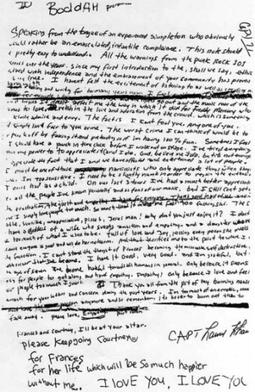Suicide of Kurt Cobain
== Suicide of Kurt Cobain ==
The suicide of Kurt Cobain, the lead singer and guitarist of the grunge band Nirvana, occurred on April 5, 1994. Cobain was found dead at his home in Seattle, Washington, with a shotgun and a suicide note nearby. His death was officially ruled as a suicide by a self-inflicted gunshot wound to the head.
Background[edit | edit source]
Kurt Cobain had a history of depression and substance abuse. He struggled with the pressures of fame and the expectations placed upon him as the frontman of Nirvana. Cobain's personal life was also tumultuous, marked by his marriage to Courtney Love, the lead singer of the band Hole, and the birth of their daughter, Frances Bean Cobain.
Events Leading Up to His Death[edit | edit source]
In the months leading up to his death, Cobain's mental health deteriorated. He had several incidents that indicated his struggles, including a near-fatal overdose in Rome in March 1994. Cobain entered a rehabilitation facility but left after a few days. He returned to Seattle, where he secluded himself in his home.
Discovery[edit | edit source]
On April 8, 1994, Cobain's body was discovered by an electrician who had arrived to install a security system. The coroner's report estimated that Cobain had died three days earlier, on April 5. A high concentration of heroin and traces of diazepam were found in his body.
Suicide Note[edit | edit source]
A suicide note was found at the scene, addressed to Cobain's childhood imaginary friend "Boddah." The note expressed Cobain's feelings of inadequacy and his inability to enjoy music and performing as he once did. It also mentioned his love for his wife and daughter.
Aftermath[edit | edit source]
Cobain's death had a profound impact on the music world and his fans. It brought attention to issues of mental health and substance abuse among musicians. Nirvana disbanded following his death, and Cobain's legacy continues to influence artists and fans alike.
Legacy[edit | edit source]
Kurt Cobain is remembered as a pivotal figure in the grunge movement and a voice of his generation. His music with Nirvana, including albums like Nevermind and In Utero, remains influential. Cobain's life and death have been the subject of numerous books, documentaries, and films.
See Also[edit | edit source]
References[edit | edit source]
External Links[edit | edit source]
Search WikiMD
Ad.Tired of being Overweight? Try W8MD's physician weight loss program.
Semaglutide (Ozempic / Wegovy and Tirzepatide (Mounjaro / Zepbound) available.
Advertise on WikiMD
|
WikiMD's Wellness Encyclopedia |
| Let Food Be Thy Medicine Medicine Thy Food - Hippocrates |
Translate this page: - East Asian
中文,
日本,
한국어,
South Asian
हिन्दी,
தமிழ்,
తెలుగు,
Urdu,
ಕನ್ನಡ,
Southeast Asian
Indonesian,
Vietnamese,
Thai,
မြန်မာဘာသာ,
বাংলা
European
español,
Deutsch,
français,
Greek,
português do Brasil,
polski,
română,
русский,
Nederlands,
norsk,
svenska,
suomi,
Italian
Middle Eastern & African
عربى,
Turkish,
Persian,
Hebrew,
Afrikaans,
isiZulu,
Kiswahili,
Other
Bulgarian,
Hungarian,
Czech,
Swedish,
മലയാളം,
मराठी,
ਪੰਜਾਬੀ,
ગુજરાતી,
Portuguese,
Ukrainian
Medical Disclaimer: WikiMD is not a substitute for professional medical advice. The information on WikiMD is provided as an information resource only, may be incorrect, outdated or misleading, and is not to be used or relied on for any diagnostic or treatment purposes. Please consult your health care provider before making any healthcare decisions or for guidance about a specific medical condition. WikiMD expressly disclaims responsibility, and shall have no liability, for any damages, loss, injury, or liability whatsoever suffered as a result of your reliance on the information contained in this site. By visiting this site you agree to the foregoing terms and conditions, which may from time to time be changed or supplemented by WikiMD. If you do not agree to the foregoing terms and conditions, you should not enter or use this site. See full disclaimer.
Credits:Most images are courtesy of Wikimedia commons, and templates, categories Wikipedia, licensed under CC BY SA or similar.
Contributors: Prab R. Tumpati, MD

